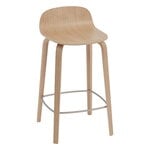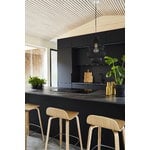Muuto’s Visu counter stool, designed by Mika Tolvanen for Muuto, is part of a chair collection characterised by a softly curved seat resting on slim wooden legs. The designer has said about his creation: "The task was to create a personal interpretation of the ever-relevant plywood chair. I wanted my chair to have an unobtrusive and timeless nature that is familiar but never boring and without sacrificing function or ergonomics. In the end, I think every detail is exactly as it is supposed to be.” Since its launch, the popular Visu collection has expanded with several versions and colour options.


Visu counter stool, 65 cm, oak
Muuto
Description
Muuto’s Visu counter stool, designed by Mika Tolvanen for Muuto, is part of a chair collection characterised by a softly curved seat resting on slim wooden legs. The designer has said about his creation: "The task was to create a personal interpretation of the ever-relevant plywood chair. I wanted my chair to have an unobtrusive and timeless nature that is familiar but never boring and without sacrificing function or ergonomics. In the end, I think every detail is exactly as it is supposed to be.” Since its launch, the popular Visu collection has expanded with several versions and colour options.
Product details (7)
- Colour
- Oak
- Width
- 42.7 cm
- Depth
- 42.3 cm
- Height
- 78.5 cm
- Seat height
- 65 cm
- Material
- Water-based lacquered oak
- Care instructions
- Clean with damp cloth
- Product ID
Designer
Mika Tolvanen (b. 1975) is a Finnish designer who graduated from the Royal College of Art, London, in 2001. Tolvanen designs mainly furniture, but also different types of interior decorating products as well as lighting. His achievements include collaborative projects with a number of well-known companies, including Muuto, Nak-Nak, Offecct and Woud. In 2015, Mika and his spouse Julie Tolvanen founded their own design office, Studio Tolvanen, in Helsinki. Tolvanen has won the Finland100 furniture design competition by Isku in 2016 and the Bruno Mathsson award in 2012, and he was awarded as the Finnish Furniture Designer of the Year 2017.
Read Mika Tolvanen's interview >
View all productsReviews (0)
Sustainability
The Product Sustainability Framework, our criteria of sustainable design, helps you find the most sustainable products in our selection. Read below which sustainability criteria this product has met.
Working conditions & labour 7/9
-
Equal opportunities for all employees
-
Commitment to UN Global Compact, fair compensation for all employees
-
Corporate responsibility requirements defined and communicated for suppliers
-
Systematic work for improved inclusion and well-being in the workplace
-
Transparent supply chain
-
Suppliers' compliance to a code of conduct ensured
-
Compliance to the UN Guiding Principles on Business and Human Rights ensured in the supply chain
-
Direct suppliers audited and certified
-
Support for community involvement in the supply chain
Eco-friendly production 9/9
-
Fair and resource-wise water-use in production
-
No incineration or landfilling of returned items
-
No use of endangered species as materials
-
No direct environmental emissions or waste (excl. GHGs) from production
-
The sustainability of direct suppliers' production is addressed and monitored
-
Production and material sourcing that respect biodiversity, animal rights, and natural ecosystems
-
Material-efficient and ecological packaging
-
Positive impact on nature’s well-being through operations that regenerate natural ecosystems
-
No potentially harmful chemicals used in own production
Climate impact 4/8
-
Company's direct greenhouse gas emissions identified and commitment to reduction
-
Product's carbon impact identified and commitment to reduction
-
Guidance on energy- and eco-efficient use of the product
-
Contribution to climate initiatives beyond the brand’s direct operations
-
Low-carbon or compensated transportation
-
Carbon footprint of the product calculated and goals set to reduce it
-
100 % renewable energy in own production and operations
-
Carbon neutral or carbon negative product
Sustainable materials 3/6
-
Sustainable and long-lasting material choices
-
No harmful or hazardous substances
-
Responsible raw material sourcing and production
-
Materials suited for circularity: monomaterials, recyclable finishings, renewable or recycled contents etc.
-
Ecological materials: natural, biodegradable, recyclable or recycled contents
-
Outstanding materials in terms of innovativeness, responsibility, sustainability and circularity: local production or sourcing, 100 % recycled content, C2C-certification etc.
Circular design 4/5
-
High aesthetic quality promoting long-term use of the product
-
Technically durable product design and material choices
-
Design for enduring life-long quality
-
Design and support for product maintenance, repair and upgradability
-
Innovative circular design solutions: circular service system, resale platform, remanufacturing, collection of used products, etc.





